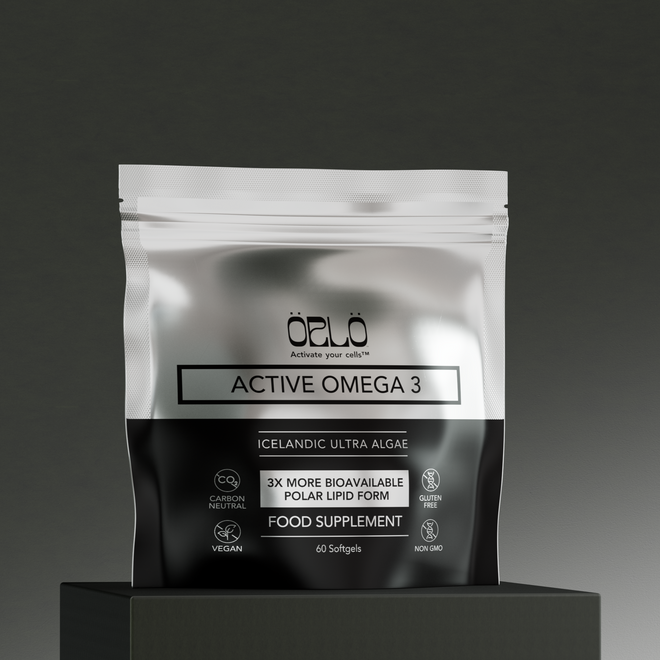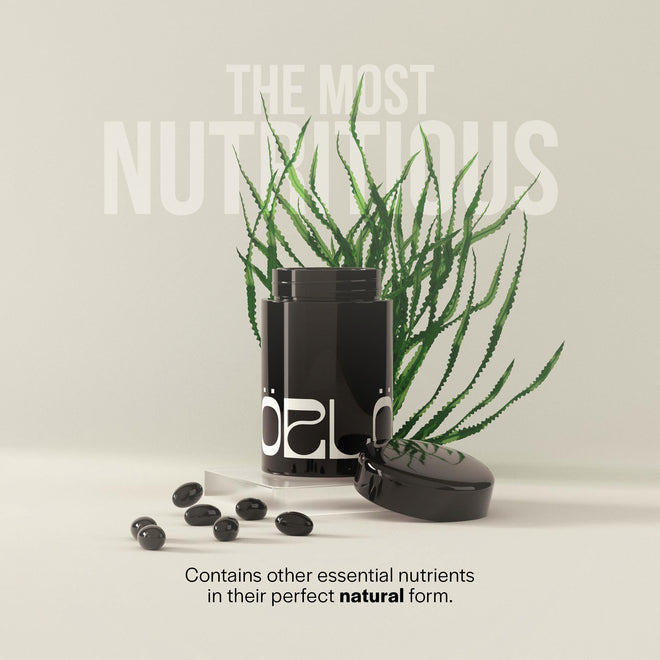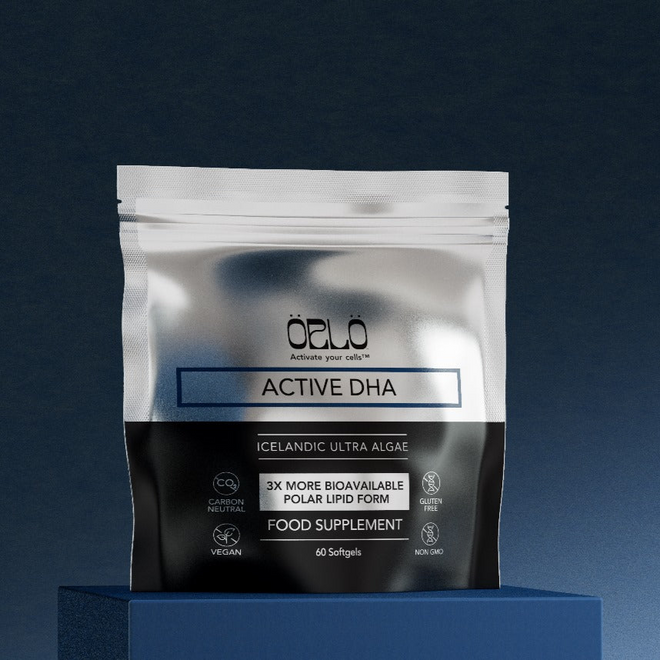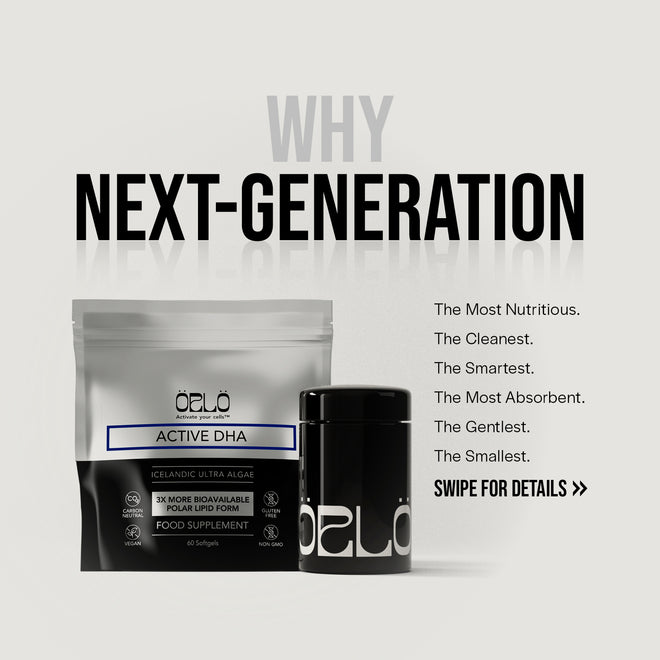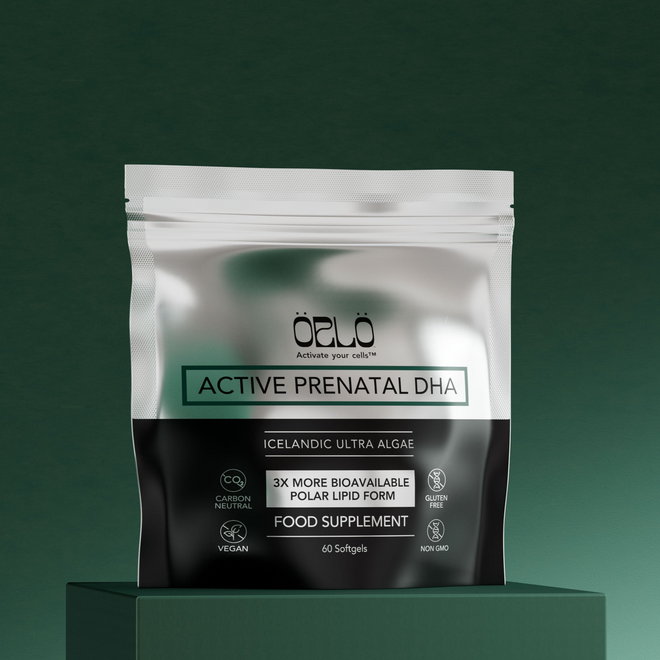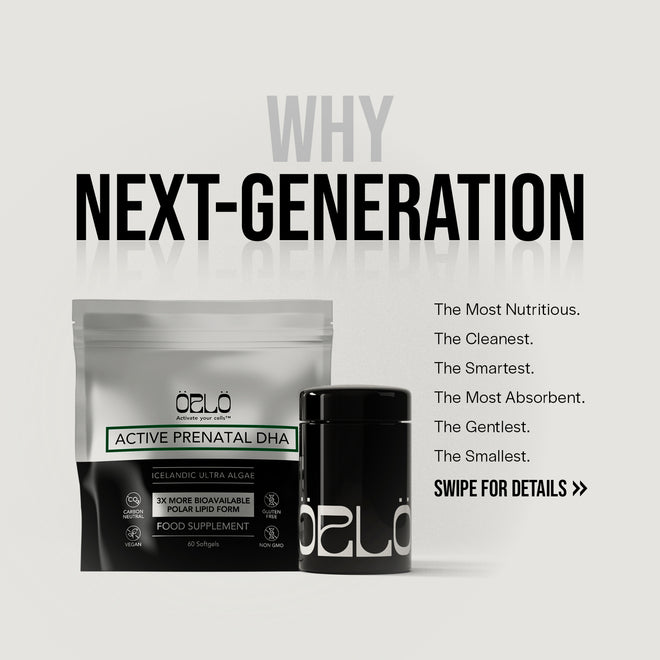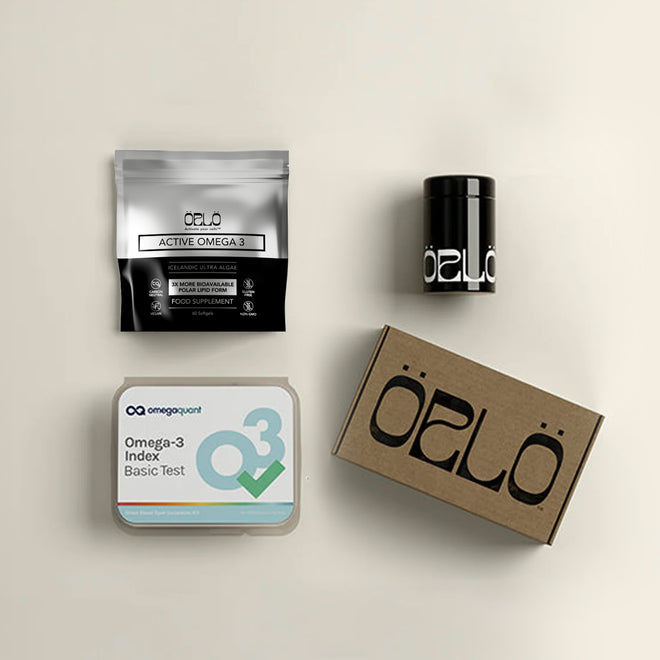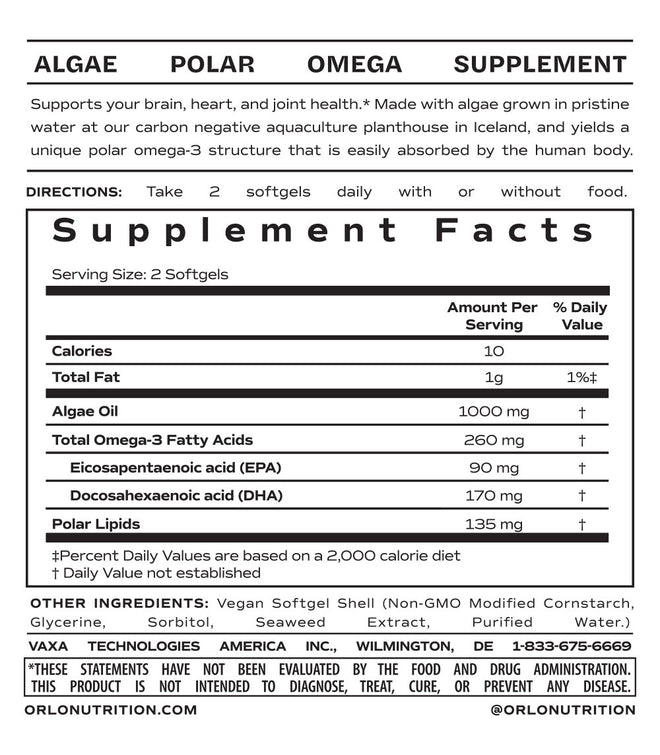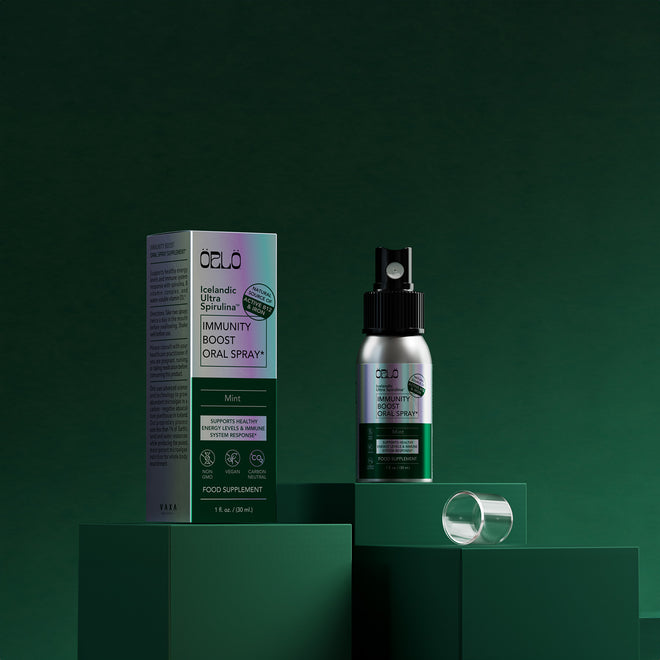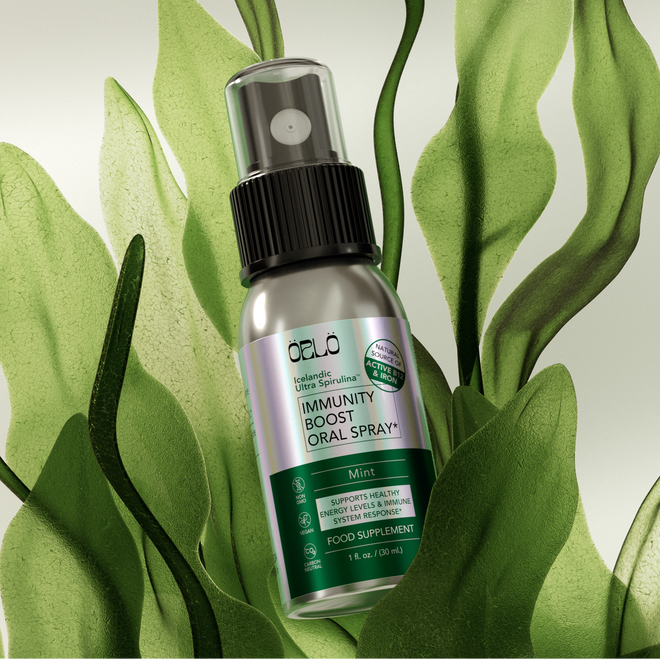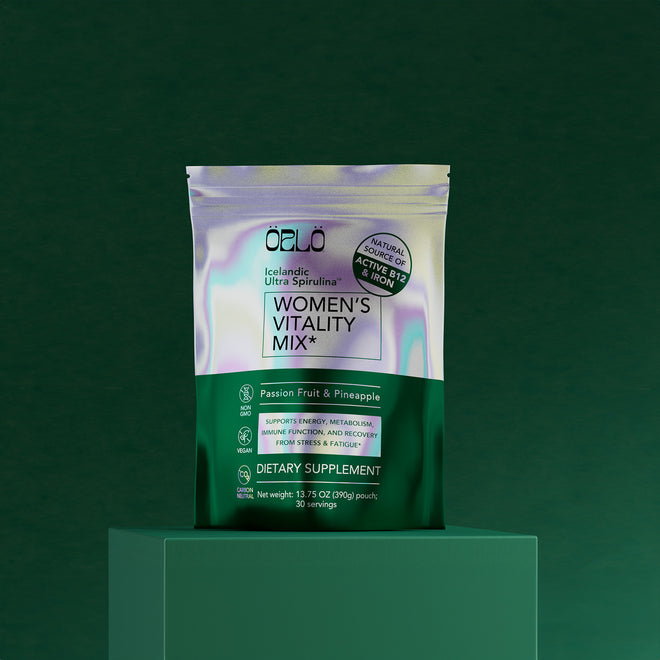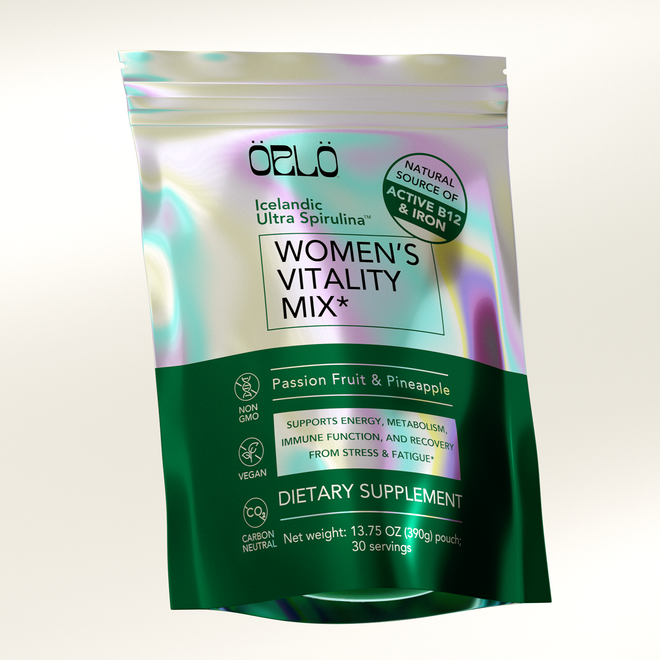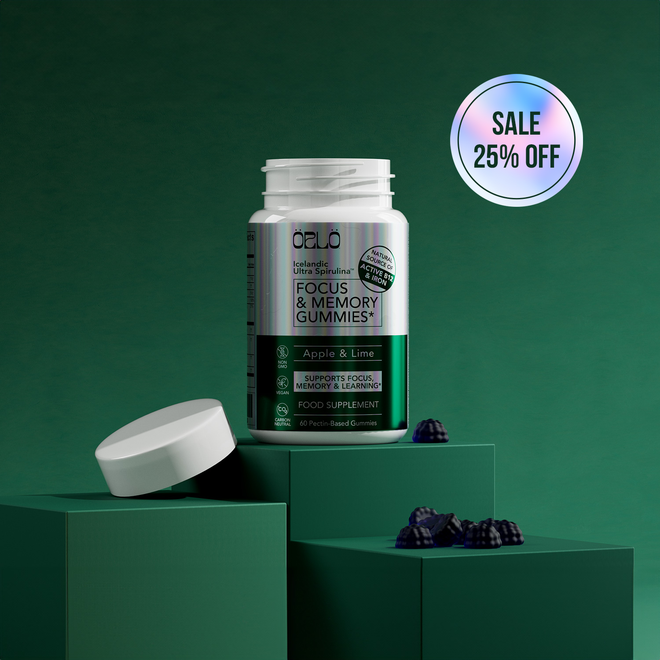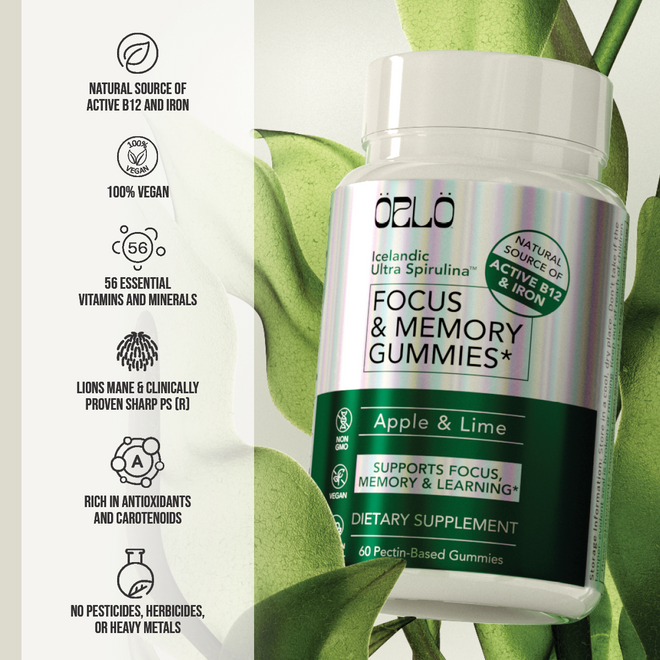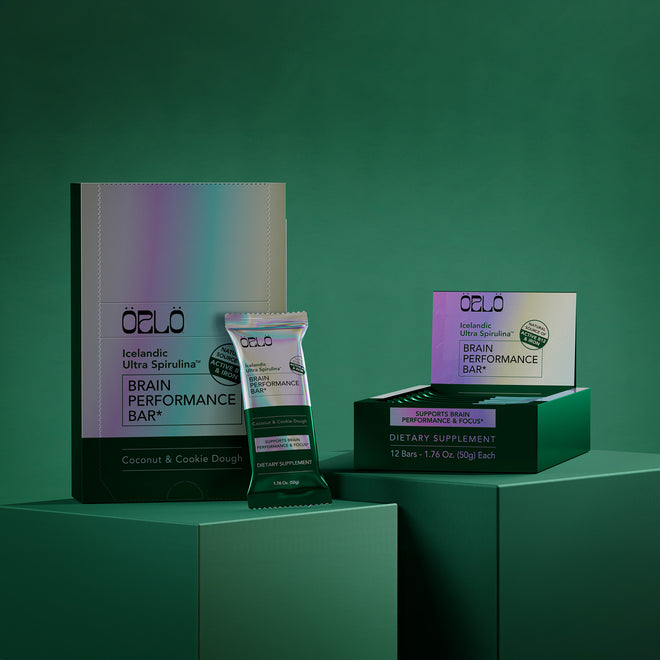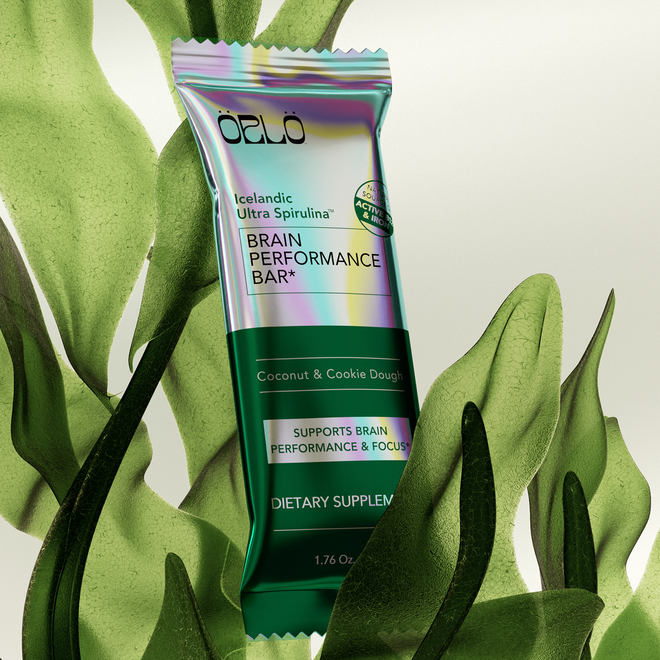25% Off - use code: HOLIDAYS
The Emerging Research World Of Omega-3 Absorption For Brain Health With Professor Melanie Plourde, Université de Sherbrooke, Québec, Canada
Watch the episode here
Professor Melanie Plourde, a full professor at the Université de Sherbrooke, Québec, Canada, found a disconnect in the important role of omega-3 for the brain. So she dived deep into this, filling in the gaps with her research program around two themes: (1) to understand how omega-3s are transferred from the blood to the brain, (2) to maximize omega-3s transport to the brain. In this episode, she joins Corinna Bellizzi to take us to the emerging research world of omega-3 as it relates to brain health. Professor Melanie investigates further by sharing how much of the foods we consume, and the nutrition we get from omega-3 can impact later expressions of health challenges. She then shares how we can supplement it to our diet and offers us a look into her recent research on how lipids traveling in the blood are transported to our brain.
Key takeaways from this episode:
- How omega-3s affect brain health
- How nutrition impacts later expressions of health issues
- The different genome types in relation to diseases
- How people can augment their diet on a daily basis
Guest Social Links:
LinkedIn: https://www.linkedin.com/in/m%C3%A9lanie-plourde-949a1636/
Research Article: https://www.sciencedirect.com/science/article/pii/S0955286322002492?fbclid=IwAR1tnRpHEWsbZEwtWatSZK0EK8Q2NatYO3mZSSuuHWN-cP2bDkcyAzG4W34#!
---
The Emerging Research World Of Omega-3 Absorption For Brain Health With Professor Melanie Plourde, Université de Sherbrooke, Québec, Canada
In this episode, we are going to dive into the world of emerging research in the world of Omega-3s as we connect with my friend, Melanie Plourde. She is a full professor at the Université de Sherbrooke, Québec, Canada. Her research program is developed around two typical research themes. 1) To understand how Omega-3s are transferred from the blood to the brain, and also 2) to maximize Omega-3 transport to the brain. She received the First Institutional Research Chair on Lipid Metabolism during aging donated by the Medical Research Center of Université de Sherbrooke. In 2020, she was awarded the Canadian Nutrition Society Young Investigator Award for Outstanding Research. Melanie, welcome to the show.
Thank you. It's a pleasure to be here.
It’s an honor. We haven't had the chance to connect in person for many years.
It's been a long time.
Before we dive into our topic and get to learn all about your important work, I'd like for you to first share why you're so passionate about Omega-3s as it relates to brain health.
One of the main reasons is that it's so complex and complexity for me is a challenge. I'd like to solve these little parts of the puzzle and contribute. The brain is so full of Omega-3s and Omega-3s are involved in many different pathways. I believe that there's a very important role for the brain and the Omega-3s to work together, but there's a lot of disconnection in the territory that puzzled me. That's part of my passion and motivation to go into these discrepancies and disconnections. I try to solve these to have a better impact on health and the prevention of cognitive decline is my major goal overall.
This touches me personally and is one of the topics that we first talked about when we met in person at ISSFAL or the International Society for the Study of Fatty Acids and Lipids, which was in Kansas. At that time, research was starting to emerge with poster presentations on how genome alleles were connecting with our absorption of key nutrients and how that might impact our health in later life as it related to things from brain degeneration, Alzheimer's, dementia and liver disease down the line through all these different health challenges.
I was learning at that moment about how those within the APOE4 genome type were at higher risk for about everything like cancer and Alzheimer's. It made me nervous to even go out and get my genetic test to even see where I was. We were even talking about at that time what the ethics of it were and the worries that people might have about finding out this information and then having it selected as a pre-existing condition or something to that effect impacting your medical insurance or who knows down the road.
We've come to a space where this information is much more available now. I have taken the 23andMe test and Ancestry.com test. I know that I have one expression of APOE4, which doesn't make me super happy, which also wasn't a complete surprise because my grandmother suffered from Alzheimer's and Parkinson's disease in her very late life. I was hoping that as we get this conversation started, you could talk about where we are with research and how much the foods we consume and the nutrition we get, particularly from Omega-3s can impact this later expression of health challenges.
There's one pretty cool stuff about APOE4 compared to other genetic risks of having Alzheimer's disease and it's that not all APOE4 carriers will develop the disease. For me, it means that lifestyles could have a huge impact on the expression of the disease. I know that you're doing sports, you take care of your nutrition and that type of thing. It could do a huge difference in the expression of the disease.
Lifestyles could have a huge impact on the expression of the disease.
That's mainly part of my research in trying to understand how we can connect these dots together and have better recommendations. My focus is on Omega-3s and I have a huge part of my research program on the APOE4 carriers. I think that there will be a need for a specific recommendation in Omega-3s for APOE4 carriers because they have lipid metabolism that is not the same as the non-carriers.
For this specific reason, some type of supplementation might not work for them because to go to the brain, the Omega-3s need to be packaged in specific forms in the blood. As you may know, lipids need to be transported by lipoproteins in the blood because they're not soluble in water. Because of that and the modification of the lipoprotein profile in APOE4 carriers, our group thinks that if you give a triglycerides form of Omega-3 to APOE4 carriers, it might be packed in triglycerides and might never reach the brain because this is not the specific form reaching the brain.
The two forms are phosphatidylcholine and phosphatidylethanolamine and the non-esterified form of Omega-3s. This is why we try to understand whether you're an APOE4 carrier or not if you have different types of lipid metabolism and different type of transportation of Omega-3s, and whether there will be cognitive benefits after that. We do clinical trials for that and also animal trials because we can investigate some of the mechanisms. I don't know if I totally answered your question.
You are and this is leading us into a discussion of why, for instance, you would study these things in animals and animal models as opposed to human populations. For one, the life cycle is much shorter so it's easier to do long-term studies in an animal model for something like a rodent versus a human who can live 100 years. Secondarily, you can control all of the nutrition inputs and we all know, as humans, it is very hard to control all of the inputs that we consume.
If I'm hearing you correctly, if you are to take an oil that is in a liquid form like you would pour in a glass of water, it floats on top. When you consume it in your body, it would take some time to get integrated into your tissues and then potentially not be able to be carried to the brain when it's needed. A polar lipid, phospholipid, or glycolipid would be more able to do that. That may be part of the reason that we see not only necessarily quicker absorption but better absorption into certain tissues like those brain tissues. Is that correct?
That's what we think and that's what we see with our results. That's why we want to try different types of formulations. In humans, we can do what we call pharmacokinetics or pharmacodynamics. You give an Omega-3 supplement or one dose of Omega-3. You follow the increase and the decrease of Omega-3 in the blood over a certain period or you can do what we call pharmacodynamics. Every week the participants come by. We take a blood sample and measure the Omega-3s. We see when they reach the plateau of Omega-3 in their blood while they're being supplemented.
We know that doing this, there's some difference between APOE3 and APOE4 carriers. One paper is coming now. It's in the press right now. We did look at the specific pool reaching the brain and these were young APOE3 and APOE4 carriers. We had 25 in each group. They were supplemented with Omega-3s for six months. In this specific group, we saw mostly the supplementation effect. We haven't seen that much genotype effect in this specific group, but in another study, we've seen a difference in the increase of Omega-3s in the blood samples between the APOE4 carriers and non-carriers.
However, the thing that is important here is that we think that in young APOE4 carriers, we can increase the levels of Omega-3 in the two specific pools reaching the brain. Maybe this is a little bit more compromised during aging. This is the part that we want to study more because, during aging, there's a lot of modification of lipid metabolism, our lifestyles, habits, and everything. It changes the needs and requirements for specific nutrients. Omega-3s might be part of that because there's increased inflammation also during aging. This is the type of thing we're trying to look at and come up with general guidelines, but also, maybe some specific guidelines for specific groups of the population.
As I age and get older, I'm no longer in my twenties, it may be serendipitous that I ended up working in the polar lipid space as somebody who got that APOE4 genome type. As it stands for the audience here, it's important for us to quickly break down. There are several different genome types. I recall looking at research for APOE1, 2, 3, and 4. Are those the four primary?
No. It's 2, 3 and 4. There's no one.
If I recall them correctly, APOE2 was at a lesser risk for many of the health diseases that would relate to even things like smoking cigarettes or having bad habits but APOE4 was among the worst. Is that correct?
APOE2 has hypertriglyceridemia. They're at lower risk for Alzheimer's disease, but they have another risk for cardiovascular disease.
Nobody here gets out alive. That's the message.
The most neutral is the APOE3 genotype. There's no disease risk associated with this genotype. 70% of the population are APOE3 and 15% to 20% are carriers of at least one copy of the APOE4 allele.
I fall into that bank.
Let me ask you a question because I asked this question to many people and I know you're familiar with this field. How many randomized controlled trials on Omega-3s and cognition do you think there are in the literature?
I would say tens of thousands at this point. I don't know exactly, but specifically Omega-3s with regard to nutrition and the brain.
Cognition is like performing cognitive tests. Just the randomized controlled trial, not prospective or not animal trials.
Now, you refined it quite a bit. I would think if we're looking at something like DHA for brain health, it is something being a little bit more specifically rooted there that it would be much broader because there's so much research on things, even formula with DHA, which often is from an algae source in young children. If you're talking cognitive tests, typically that's older people. I venture to guess it's a small number because you're asking me, so maybe there are only a dozen. I don't know.
Most people tell me a dozen, between 10 and 20 randomized control trials, but actually, we found 78. One misunderstanding in the field was to put all the studies together like people with cognitive decline and more cognitive impairment. They put all the studies together but what we did is that we split into different groups and we saw that 67% of the randomized control trial in mild cognitive impairment shows cognitive benefits of taking the supplements. I think that nobody has seen that and overall, 90% of the studies show either positive benefits on cognition or a neutral effect. There's no harm in consuming the Omega-3s and that's the big message. You can have benefits on the whole body and on the brain by consuming these lipids.
Generally speaking, the research with regard to cognitive health tends to be focused on DHA, but typically there's also EPA present. What is your feeling about somebody that might be coming out and thinking, “I need more Omega-3?” Should they be specifically looking for something that's higher in DHA or more of a balance of the two fats, EPA and DHA?
In that specific review, we checked whether the type of supplements were having a specific positive outcome and we did not find any. At the moment, I think that EPA complements DHA. If you give too much DHA, it produces EPA from a specific metabolism. From my perspective, I tend to recommend either a balanced level of EPA and DHA or at least adding both because I think they're both in the fish and the strongest evidence for cognition is from an epidemiological study like prospective studies. In fish, there's both. Why should we just eat DHA? I think there's a benefit of EPA in the brain that we haven't found yet and I'm not ready to say that there's absolutely no benefit of EPA for the brain. I cannot support that.
If you think about human history, we've generally evolved close to the coastlines. We've consumed fish for the bulk of our history and because fish consume algae that produce DHA and also algae that produce EPA, they get both. That's why they have a balance in their bodies as well. I've even seen some research on unopposed EPA, meaning a high potency EPA with no DHA specifically for something like mood or conditions related to brain health and a healthy mood, a healthy mind, or something along those lines.
They're thinking specifically that it has to do with the reduction overall in inflammatory markers in our bodies and that by quashing some of an out-of-control inflammation, let's say from overconsuming things like seed oils or foods that are high in Omega-6s, even animal meats, which are high in arachidonic acid competing fat in a way with the Omega-3s EPA and DHA.
We end up getting too much of those pro-inflammatory prostaglandins, leukotrienes, and cytokines and too little of those that are anti-inflammatory. When we reduce the Omega-6s overall and/or increase our Omega-3s, then we're able to get to a better balance. Our mental health is more stable and then we also have the building blocks that we need to create that long-term brain health, better cognition, etc.
It's no surprise when you learn that half of the fat in your brain and eyes is made up of DHA, of course, you need Omega-3s every day. We live in this world where people don't necessarily understand that even though we aren't like starfish, you can't cut off an arm and regrow it. Our bodies regenerate every day of our lives and we do replace the cells within our bodies. If you further understand that EPA and DHA are involved in our metabolic processes within cells or involved in every cell in our body, then you ultimately understand or gain this deeper understanding of why it's so critical that we look to our nutrition in this particular way.
If we're vegan or if we want to go more plant-based, now we can get EPA and DHA from algae oils. Even a few years ago, it wasn't even possible to get EPA from an algae oil product, but now we have that ability. I'm encouraged by that. You mentioned consuming these fats in particular to supplement a healthy diet and to supplement something like consuming fish on a regular basis. However, if somebody is not consuming fish 2 to 3 times a week, which can be a lot and I know my kids won't eat fish that often even if I were to prepare it for them. We need to think about how we're augmenting our levels and what the levels of EPA and DHA are that we're bringing in.
We talked about things like 1 gram or 2 grams of Omega-3s and these are not specifically like the alpha-linolenic acid in flax oil because of the fact that they don't provide a direct source of EPA and DHA. Even a 1 gram of fish oil isn't necessarily going to supply 1 gram of EPA and DHA. I know that ISSFAL and other regulatory bodies have recommended things like 500 milligrams a day of EPA and DHA. Where do you stand on that? What are you thinking people need to make sure that they are augmenting their diet on a daily basis?
It's difficult because there are so many companies selling Omega-3s.
Also, so many factors, dietary and otherwise.
There are different qualities. I was so surprised not to see so many studies looking at the bioavailability of Omega-3s depending on their chemical structure. In terms of the level of Omega-3s, I think that EPA and DHA at 500 milligrams could increase a lot the blood. There's a nice curve. I like to show it. It's the logarithmic link between the levels of Omega-3 you eat versus the levels you get in the plasma phospholipids. It looks like that between 0 and 1 gram, there's this huge increase of Omega-3s, and then after 1 gram, it increases a little bit again, but more like a plateau.
Between 0 and 1 gram is a good way to increase the levels of Omega-3s drastically in the blend. Whereas after that, maybe for specific conditions, there might be benefits of having more Omega-3s but it's true that 1 gram of fish oil does not provide one gram of EPA plus DHA. There are other fatty acids. We need to be careful about looking at the labels and looking at how much Omega-3s is there in the actual supplements.
On my day-to-day, because I'm consuming my Omegas in a polar lipid form and I have trust that I'm getting more into my system because of that, I'm confident taking 2 or 3 small soft gels and getting about 500 milligrams of EPA and DHA a day from that. Also, I try to limit my seed oils. I don't use a lot of processed foods. I do try to consume healthy Omega-3s and consume things like walnuts too because they're healthy foods. They are higher in Omega-3, but it's in that alpha-linolenic form.
Your body has to go through several processes to make it into EPA and DHA. The thing that I like to remind people is the logarithmic approach that people get the most benefit essentially as far as absorption and that first gram of oil that they take in. Your body, as a system, is built to integrate nutrients together.

If you consume something like fat with your food, it may improve your overall absorption because digestion is slowed a little bit. At the same time, if you're consuming a lot of competing fats and it was also from a plant source, your body had to make the EPA and DHA from it. Let's say you consumed seed oil alongside your walnuts, suddenly, it's a lot harder to get to the EPA and DHA that your body needs.
This is why so much of the research behind Omega-3s and in that direct EPA and DHA form is so compelling and so obvious because it's like we've circumvented that typical trap that we might fall into. I love that about Omega-3s and I think overall when it comes to giving ourselves the best chance at a healthy diet and getting them in every day is critical.
I've trained my son to swallow soft gels. We're not giving him gummies to get his Omega-3s because I hated the added sugar of that. In one 500-milligram soft gel, he's getting at least 150 milligrams of EPA and DHA combined. I figure that's pretty good for a seven-year-old and there's no complaining. It goes down his throat really easily with a little bit of water. I know you also are a mother. You have a few kids. When did you start supplementing your kids? What was your experience like there?
I've been very focused to eat fish. We eat a lot of fish at home and my kids love sushi. I have to be honest, I don't supplement my kids, but they eat at least two portions of fatty fish every week. The only time I supplemented my kids was my son had a concussion at one time. He wasn't able to swallow the capsules and he liked balsamic vinegar. I put the Omega-3 oils with balsamic vinegar on the pita bread.
You made him a bruschetta.
He was eating that and said, “Oh my God.”
That could be quite good.
He liked it. It was very tasty, but at least he was eating the Omega-3s and came back very fast on his foot from the concussion.
This is another area of research with Omega-3s that's very well documented and even giving Omega-3s in those cases intravenously to people who've had a concussion to help them recover. As with the Sago Mine survivor, I wonder if you remember that particular study where he had been without oxygen for some time and also had some brain trauma and swelling. They gave him an intravenous high dose of Omega-3. We’re concerned with things like, “Would he be able to procreate?” It’s simple things that we don't necessarily think about and the results for him in particular were quite astounding. The benefits of Omega-3 are brain health and beyond.
Looking at your recent study, published in the Journal of Nutritional Biochemistry, you're talking specifically about the plasma liver-brain access of Omega-3 fatty acid metabolism in a mouse study that is knocked in for the human apolipoprotein E epsilon 4 allele or APOE4. One of the things that this brought to mind was the first ISSFAL I went through back in 2008 where I heard this Italian researcher say that there was a direct connection between liver and brain health and ultimately, that we all needed to mind our livers.
He also went on to say that alcohol consumption was probably not a good idea. So far, all of the neurologists I've stayed in touch with have said the same. There's no scientific evidence that alcohol's a good thing because there seems to be this plasma-liver-brain connection. Given that you're presently studying this, I would love for you to share the key takeaways from this recent research published on October 8th, 2022.
This paper is very important because, in my research, I was trying to see how lipids traveling in the blood are transported within the brain and whether if you have more lipids in the blood, then you will have more lipids and more Omega-3s in the brain as well. I thought that it was pretty straightforward. You increase Omega-3s in the blood and then you have to increase Omega-3 in the brain and end of the story.
In prospective studies, we see that if you have higher levels of Omega-3s in the blood, you have better cognitive scores. I have animal trials where we performed many quantifications of Omega-3s in the plasma, in the liver, in the brain cortex, hippocampus, and different regions of the brain. We tested the animal for behavioral assessments. I don't like to talk about cognitive scores in an animal. I prefer to say behavior. It's a memory test for animals and that type of thing.
If you have higher levels of omega-3 in the blood, you have better cognitive scores.
We had the scores and I say, “That's a nice model to look at if there's a different type of links between what we have in the blood with the Omega-3s and whether we have the actual higher levels in the brain.” What we found is that this specific link was mostly in APOE4 carriers. If you have higher levels of Omega-3s in the blood, they had higher and better cognitive scores. The opposite of the Omega-6 was in the hippocampus and I was very surprised about that. If the APOE4 mice had higher levels of arachidonic in the hippocampus, they had lower scores on the behavioral test.
The thing is that the Omega-3s and Omega-6s in the brain are what we can modulate. In this specific trial, we had mice fed the control and we had mice fed an Omega-3 diet. For the correlation, we didn't put the animals like my diet. We pooled it all together because we wanted a huge range of Omega-3s. It means that probably it's the animal having the controlled diet that had higher levels of Omega-6-like arachidonic acids in the brain.
Those animals that had the DHA diet had better cognitive scores. In this specific trial, we published a paper in 2017 showing that if an APOE4 mouse had the DHA diet, it prevented cognitive deficits compared to when they were fed the controlled diet. In APOE3 mice, whether they had the control or the DHA diet, they did not develop very strong cognitive deficits.
It was linking the Omega-3s and the Omega-6 in the blood and in the brain to the cognitive scores. That's a very important paper showing that we don't need to put everybody in the same basket and we need to be a bit more specific about the genotype for the recommendation. However, the good news with that is that if we're able to increase the levels of Omega-3s in the blood, then maybe in humans, we are able to improve the cognitive scores.

This is reminding me in a way of a study that was performed on smokers where they showed that, let’s say in the general population, smokers who consumed Omega-3s versus non-smokers who consumed Omega-3s and also those that didn't. You could have a smoker that didn't consume Omega-3s. It was a 2x2 study. You could also have a non-smoker who did or didn't consume Omega-3s.
What they found was that the non-smokers who consumed Omega-3s were best off with all their health markers. The smokers who did not consume Omega-3s were worse off. However, the smokers who did consume Omega-3s in their daily diet had health markers comparable to a non-smoker who did not consume Omega-3s. If they're looking at cardiovascular health and incidents of cardiovascular health markers, t generally speaking, it was protective.
What we tend to see in the research when it comes to the consumption of Omega-3s is that they seem to have a protective effect against the potential onslaught of disease. That's why for me, it's like, “It's a no-brainer. Everybody should consume some.” If you don't know your allele type. If you happen to be APOE4 versus APOE3 or if like me, you were frightened and didn't want to find out for some time you can at least be safeguarding your health in some way. It's very interesting to see that in the most poorly performing that the arachidonic acid levels were higher because it's probably supplanting DHA there because that's what's present in your diet. Without the DHA, your brain has to make itself with something so it'll use arachidonic acid.
If you don't have any Omega-3s, you explained that the body needs to turn over the cells and everything and then there are lipids in it. The brain needs to turn over the cells to change the cells to repair the brain. In the process of repairing these cells and generating new cells, if there are no Omega-3s available, it will take other fatty acids that are available. My conception of this is that once you age, you accumulate a small dysregulation in the fatty acid profile in your brain cells and all over your body.
This could change a little bit like how your cells functions and their best functionality. In this process of aging, the homeostasis of fatty acid is not maintained throughout our lives. This is the concept of having these Omega-3s to be available to be involved and included in the brain lipid membranes throughout life. If there are no Omega-3s, it will be modified by other fatty acids and mostly, these fatty acids available would be Omega-6.
This would also be why it's so dangerous to consume trans fats because if that's all you're getting and these trans fats are created fats. They don't exist in nature. You're creating problems. I have one more question for you and then I'd love to get your wrap-up thoughts, but that question is related to future research. What are you most excited about right now in the world of research as it relates to brain health and Omega-3s?
To be speaking about what I'm doing now. My group is close to some nice breakthroughs regarding one specific tissue in the brain, which is called the choroid plexus. The choroid plexus is the tissue secreting cerebrospinal fluid within the brain. The brain is filled with a lot of water. This water is synthesized by this special tissue called the choroid plexus. We have been able to dissect this specific tissue in the brain. We're very excited about it because we've been performing lipid profile and transcriptomics.
We know that during aging, there's a huge modification of the transcriptomics of the choroid plexus and people have been studying the brain in compartments or in silos. We need to integrate the different information we're getting from the different parts of the brain, but also connect it to the periphery to make the story complete. I think that we will make great advancements with that especially since now, we have good momentum in the cardiovascular field in Omega-3s which is moving to have Omega-3 drugs for lowering triglycerides. I think that the next step will probably be for cognition, but we need to be very careful about how we design our things to avoid fraudulent papers.
There are so many nootropics or different supplements for brain health. Joe Rogan has made a killing with his brand. There are a lot of products out there and many of which seem to be geared around some stimulant and may not necessarily be the best for long-term health there. There is a lot of question with regard to research and what people should consume on a daily basis long-term.
That is why so many nutritionists fall back on a healthy diet first and supplement a few key things like a multivitamin and Omega3 from algae that we produce at Orlo Nutrition or the basics like getting more Vitamin D to support your immune health, spending a little bit of time in the sun, and making sure that you eat green leafy vegetables and if you're not eating enough of them, also consume Vitamin K too.
If you have heart health markers or risk factors, maybe you would consider adding CoQ10, but these aren't the thing that every single person goes out there and just buys willy-nilly that you make informed decisions based on your personal health. The conversation we had before we got started with this whole thing was this perspective that we're getting to a more personalized approach to nutrition because we have so much information available.
We can understand then that somebody who is of this APOE4 type may have a harder time assimilating certain nutrients or if you happen to have an inborn insufficiency because of MTHFR expression or something along those lines that you're able to cater then your need for B vitamins and take the methylated form of B vitamins supplementally because of the knowledge that you're able to garnish. I'm curious if you tend to recommend people in your life get a genetic test to understand what their health markers could be.
I'm cautious about that. There are different reasons for that. For the APOE4, I don't recommend it because currently, we don't have anything very specific to offer. For some people, it could bring more anxiety than benefits to knowing their genotype. Once you have the genotype and you don't have anything to offer, then maybe it's not worth it to get the genotype. In my clinical trials, we don't dedicate the genotypes to participants. They need to agree to that because I don't want to deal with the anxiety it will generate for participants.
From my personal perspective, finding out a little bit made me nervous, but it happened to also come with the genetic test and I didn't expect it to. What's interesting about how 23AndMe is running their particular platform is that they have all these health screening questions that they'll allow you to participate in. I learned, for instance, that for some reason my genetic composition, I'm less likely to be afraid of heights. As it would turn out, I've jumped out of airplanes and never had a fear of that moment.
There is some other very interesting information that comes out of these assessments where they're taking broad swaths of the population and studying your genome type and then doing different surveys to individuals and then finding commonalities that are even behaviorally and preference-based, like tends to enjoy adventure sports more than somebody who doesn't have this genome type. It was very interesting.
I think that personalized nutrition is coming and nutritionist needs to be better trained for that because some specific nutrients might be very helpful to optimize what nutrients should be taken and in what form. It's just the perspective of different types of nutrients but for some specific cases, it will come and genetics will be very useful to make this nutritional recommendation.

As we wrap up, I like to ask my guests if they could leave one message for our audience, a thought or a closing word. What would you like to share with them?
Every life needs to be balanced. As a researcher, we love and we're passionate about our work and everything, but still, we have families and nutrition is a bit like this too. We need to find the right balance and to find the right Omega-3s to take because these are very important for our body homeostasis or the balance we keep inside the cells, body, and minds as well. That would be my key point. The balance needs to be reached for everybody to have good health.
Balance needs to be reached for everybody to have good health.
That's a good message to land upon. Ultimately, getting the best nutrition balance that we can to achieve our best health and also make sure we're not over-consuming Omega-6s and under-consuming Omega-3s because that won't be good for long-term health anyway. Thank you so much for joining me.
Thank you, Corinna. It was a pleasure.
---
You can learn more about Professor Melanie Plourde’s important work in Omega-3s as it relates to brain health including this most recent study, which specifically investigated the plasma liver-brain connection of Omega-3 fatty acids and as it would relate to even APOE3 and APOE4 genome types. If you have questions specific to the content we covered, I encourage you to reach out via email to Hello@OrloNutrition.com.
I also want to remind everyone that if you want to go ahead and double down on your Omega-3 game, you can visit OrloNutrition.com and you can use the coupon code NWC10 for an added 10% off at your checkout point. As we close this show, I hope you'll raise a cup of your favorite beverage with me as I drink a sip of my coffee and say my closing words. Here's to your health.
Important Links
- Melanie Plourde - LinkedIn
- https://www.ScienceDirect.com/science/article/pii/S0955286322002492?fbclid=IwAR1tnRpHEWsbZEwtWatSZK0EK8Q2NatYO3mZSSuuHWN-cP2bDkcyAzG4W34#!
- 23andMe
- Ancestry.com
- Hello@OrloNutrition.com
About Melanie Plourde
 Melanie Plourde is a full professor at the Université de Sherbrooke, Québec, Canada. Her research program is developed around two research themes: (1) to understand how omega-3s are transferred from the blood to the brain, (2) Maximize omega-3s transport to the brain. She received the first institutional Research Chair on lipid metabolism during aging donated by the Medical Research Center of Université de Sherbrooke. In 2020, she was awarded the Canadian Nutrition Society Young Investigator Award for Outstanding Research.
Melanie Plourde is a full professor at the Université de Sherbrooke, Québec, Canada. Her research program is developed around two research themes: (1) to understand how omega-3s are transferred from the blood to the brain, (2) Maximize omega-3s transport to the brain. She received the first institutional Research Chair on lipid metabolism during aging donated by the Medical Research Center of Université de Sherbrooke. In 2020, she was awarded the Canadian Nutrition Society Young Investigator Award for Outstanding Research.
